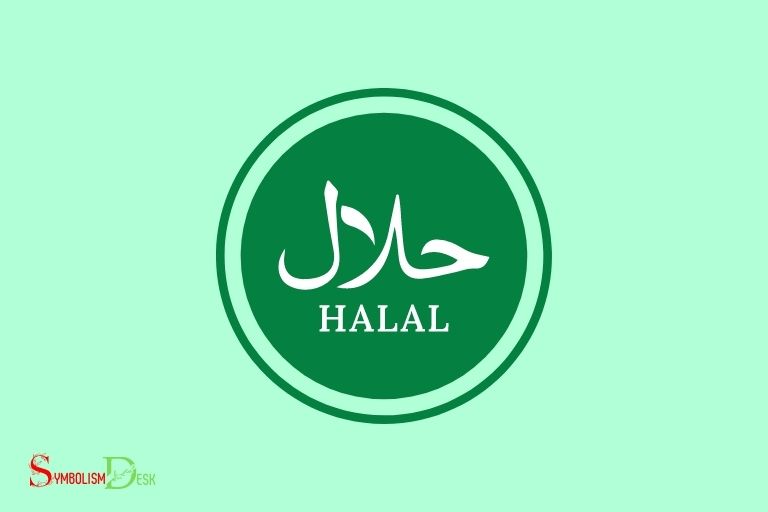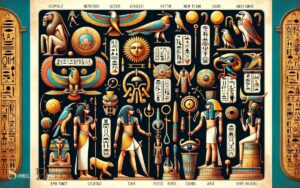What Does the Halal Symbol Mean? Islamic Dietary Laws!
The Halal symbol signifies that a product is prepared following Islamic dietary laws, ensuring that it is permissible for consumption by Muslims.
Halal is an Arabic term that translates to “permissible” or “lawful.” In the context of food, it refers to items that meet the dietary requirements set forth in the Quran.
These dietary laws ensure that food is prepared in a clean and hygienic manner and that certain ingredients, particularly pork and alcohol, are excluded.
Halal certification is granted by Islamic authorities who inspect and approve the food production process.
The Halal symbol on a product guarantees that it has been prepared according to the strict guidelines set by Islamic dietary laws.
This means that the food is not only free from impermissible ingredients, but it is also prepared in a manner that emphasizes cleanliness and hygiene.
The Halal certification process helps reassure Muslim consumers that the product is suitable for their consumption, adhering to their religious beliefs and dietary restrictions.
6 Titles: The Meaning of the Halal Symbol
| Title | Description |
|---|---|
| Halal Symbol | A mark or logo indicating that a product is permissible according to Islamic law |
| Meaning | The word “halal” means “permissible” in Arabic; the symbol indicates that a product follows Islamic dietary laws |
| Food and Drinks | Halal symbol on food products signifies that the ingredients and processing methods are halal compliant, including the absence of pork, alcohol, and blood |
| Slaughter | The halal symbol on meat products certifies that the animal was slaughtered in accordance with Islamic law (zabiha), involving a swift, deep incision across the neck cutting through the jugular veins, carotid arteries, and trachea using a sharp knife, while reciting the name of Allah (God) |
| Certification | Organizations or authorities, like Halal Certification Agencies, verify and certify that a product is halal compliant before allowing the use of the halal symbol |
| Importance | The halal symbol helps Muslim consumers easily identify permissible products, ensuring they are adhering to their religious dietary requirements |
Key Takeaway

Five Facts About: The Halal Symbol Mean
What Is The Halal Symbol And Where Is It Found?
Definition Of The Halal Symbol
The halal symbol is a certification that signifies that a particular product is permissible to consume according to islamic law.
Halal is an arabic term that means ‘permissible’ or ‘lawful’. The halal symbol indicates that the product has been produced and processed in accordance with islamic dietary laws and regulations.
History And Origins Of The Halal Symbol
The use of the halal symbol dates back to the early 1970s, when the islamic food and nutrition council of america (ifanca) was established.
The council was tasked with the responsibility of ensuring that food products meet the dietary requirements of muslims in north america.
Ifanca, being the first muslim organization to certify and label halal food products, decided to use the halal symbol to make it easier for muslims to identify which products were halal.
Where Is The Symbol Found?
The halal symbol is usually found on the packaging of food products and also in restaurants. The halal symbol can also be found in muslim majority countries on a wide range of products, ranging from food items to healthcare products.
Here are some examples of where you might find the halal symbol:
- Food products such as meat, poultry, dairy products, canned goods, and frozen food products
- Cosmetics and personal care items such as soap, shampoo, and lotion
- Pharmaceutical products such as vitamins, supplements, and medicine
When in doubt, look for the halal symbol on the product packaging or ask the vendor if the product is halal certified.
The halal symbol is an emblem of authenticity for muslims who follow islamic dietary laws and regulations.
It is an indication that a particular product has been produced, processed, and packaged in a way that maintains the integrity of the halal requirements.
Therefore, when you see the halal symbol, you can be assured that the product is safe for consumption and meets the islamic dietary guidelines.
The Importance Of The Halal Symbol
The Religious Significance Of The Halal Symbol
The halal symbol is an important aspect of islamic dietary laws. It ensures that food has been prepared and processed according to islamic guidelines. In addition to the halal symbol, there is also the Olukai symbol, which is important in Polynesian culture. Uncovering Olukai symbol’s meaning can provide insight into the history and traditions of the Polynesian people, as well as the significance of certain foods and rituals in their culture. Just like the halal symbol, the Olukai symbol plays a crucial role in ensuring that food and products are prepared and used in a way that is respectful of the cultural and religious beliefs of the Polynesian people.
This symbol ensures that the food is permissible or lawful for muslims to consume. The symbol is a reflection of muslim faith and is highly respected by the muslim community.
- Muslims consider the consumption of halal food as a way to please god (allah).
- For muslims, consuming halal food is not just a physical need, but it is also a spiritual practice.
- The halal symbol also represents the values of transparency and trustworthiness that are fundamental to islamic culture.
The Growing Popularity Of Halal Food
In recent years, halal food has gained popularity beyond the muslim community. The reason for this increase in demand is due to several factors.
- Non-muslims are increasingly becoming more health-conscious, and halal food is viewed as a healthier option due to the strict guidelines for the preparation and processing of the food.
- The rise of the muslim population in several countries has also created a demand for halal food.
- Non-muslims have also become more aware of the ethical values that halal food represents.
The Economic Impact Of Halal Certification
Halal certification has a significant economic impact on several industries, including the food industry. Halal certification is a crucial aspect for businesses that wish to cater to the muslim community and beyond.
- Halal certification provides the assurance that the food is prepared according to islamic guidelines, which increases consumer confidence in the product.
- This increased consumer confidence leads to an increase in sales and ultimately, revenue for businesses.
- Not only does this benefit businesses, but it also benefits the muslim community by providing them with a wider range of food options.
The halal symbol is of significant religious importance, and its growing popularity has led to an increasing demand for halal food both within and outside the muslim community.
The economic impact of halal certification has also been significant for several industries, indicating a positive trend in the future of halal food.
The Halal Certification Process
The halal symbol is one known to many around the globe, primarily associated with food and drink products recognized as permissible under islamic law.
However, not everyone knows what the halal certification process entails, the different organizations involved, and the challenges businesses face in obtaining certification.
This blog post aims to shed light on these topics.
The Steps Involved In Obtaining Halal Certification
To obtain halal certification, businesses must undergo a rigorous process, which involves the following steps:
- Application: The business applies for certification from a recognized halal certification body, providing comprehensive details about its products and manufacturing processes.
- Inspection and audit: A halal inspector visits the location, inspects the facilities, verifies the information provided in the application, and conducts an audit of the production process.
- Compliance assessment: The information and audit findings are assessed against the relevant halal guidelines to determine compliance.
- Decision and certification: If the business meets the compliance requirements, it is issued a halal certification with the recognized halal symbol for its products.
The Different Halal Certification Organizations And Their Criteria
Several halal certification organizations exist worldwide, applying their criteria to ensure businesses meet the required halal standards.
Some of the most recognized organizations include:
- Islamic services of america (isa): Isa operates in north america and seeks to ensure that products meet the islamic dietary laws and regulations.
- Halal certification services (hcs): Hcs is one of the oldest and most recognized certification organizations worldwide.
Each certification body has its criteria, which businesses must meet.
However, these criteria are generally consistent as they’re based on islamic dietary laws, including the type of animal slaughtered, the method used in slaughter, and the food ingredients used.
The Challenges Faced By Businesses Seeking Halal Certification
While certification may seem like the optimal choice to have wider market reach, obtaining halal certification in itself can be challenging for businesses.
Some of the challenges businesses face include:
- Additional costs: Obtaining halal certification requires additional investments in facilities, staff, training, and auditing.
- Meeting criteria: The certification criteria require meticulous attention to detail, and businesses must ensure they adhere to the guidelines. This can pose a challenge to businesses with limited resources and small-scale production.
- Cultural barriers: Cultural barriers in the food and beverage industry can pose a severe challenge, especially when non-muslim to non-muslim trade becomes a transnational process with religious differences, language barriers, lack of knowledge in islamic guidelines, and communication issues being the main obstacles.
- Unfamiliarity with the certification process: Halal certification is still a relatively unfamiliar concept to some businesses, and navigating the certification process can be daunting, leading them to yield to prohibitive business endeavors.
Achieving halal certification is a rigorous process underscoring a keen focus on every detail in the halal guidelines to meet the universal muslim practices and beliefs.
The different certification organizations provide businesses and consumers, alike with confidence, that they’re buying or selling products that conform to their lifestyle and religious requirements,
but businesses must meet different challenges that accompany the certification process.
Misunderstandings About The Halal Symbol
The halal symbol is widely recognised around the world as a sign that a particular product is permissible for muslims.
However, there are also several misunderstandings associated with this symbol. Let’s explore some of the common misconceptions about halal food and debunk myths surrounding halal certification.
Common Misconceptions About Halal Food
- Muslims only eat halal food: This is a common misconception. Muslim dietary laws not only regulate what is permissible (halal) but also what is not (haram). While muslims are required to consume halal food, they also avoid haram food such as pork, alcohol and certain meat that is not slaughtered properly according to islamic law.
- Halal food is only for muslims: Anyone can eat halal food, just like anyone can eat kosher food. Halal food is simply food that is permissible under islamic law.
- Halal food is only arabic cuisine: This is also a common misconception. Halal food can be of any cuisine, as long as it adheres to islamic dietary laws.
The Difference Between Halal And Haram
- Halal: Halal food is permissible for consumption by muslims, and it is prepared according to islamic dietary laws.
- Haram: Haram food is prohibited for muslims, including pork, alcohol, and any meat that is not slaughtered according to islamic law.
Debunking Myths Surrounding Halal Certification
- Halal certification is expensive: While there may be some costs associated with halal certification, it is not an expensive process. Certification costs vary depending on the type of product being certified and the certification agency used. In many cases, the cost is relatively low.
- Halal certification is only for food products: Halal certification is not just for food products. It can also apply to pharmaceuticals, cosmetics and other non-food products.
- Halal certification is a guarantee of quality: Halal certification is a guarantee of adherence to islamic dietary laws, but it is not a guarantee of quality. Just because a product has the halal symbol, it does not mean that it is of high quality or safe to consume.
Halal food is not only for muslims but for anyone who wants to consume food prepared according to islamic dietary laws. It is important to understand the difference between halal and haram food, and to dispel common myths surrounding halal certification.
Does the Cloud Symbol in App Store Mean That My Data Is Backed Up?
When you spot the cloud symbol in app store, it signifies that your data is backed up. This small yet significant logo indicates that your information is securely stored in the cloud. So, rest assured that even if anything happens to your device, your data remains safe and accessible.
FAQ About What Does The Halal Symbol Mean
What Does The Halal Symbol Mean?
A halal symbol represents that food is permissible to consume from the islamic perspective.
Is The Halal Symbol Mandatory?
The halal symbol is not compulsory, but many food manufacturers and restaurants display it to attract muslim customers.
Who Grants The Halal Certification?
Halal certification is awarded by an accredited islamic certifying organization that ensures all guidelines are met.
What Are The Criteria For Halal Certification?
The food should not contain non-permissible animal-derived ingredients, such as pork, and should be prepared in a halal way.
Can Non-Muslims Eat Halal Food?
Yes, anyone can consume halal food, and it is widely available in many countries around the world.
Conclusion
Overall, understanding the halal symbol can help consumers make informed decisions about their food choices. It represents a set of standards and guidelines that aim to promote ethical and sustainable practices in the food industry.
As the demand for halal products continues to grow, it’s essential for businesses to take notice and cater to the needs of this market.
By obtaining halal certification, companies can engage with muslim consumers and enhance their trust in the products they offer.
Whether you are muslim or not, being aware of the halal symbol and what it entails can lead to a more conscious and responsible consumption of food.
As we strive towards a more inclusive and diverse society, embracing halal products can be a step towards that goal.






